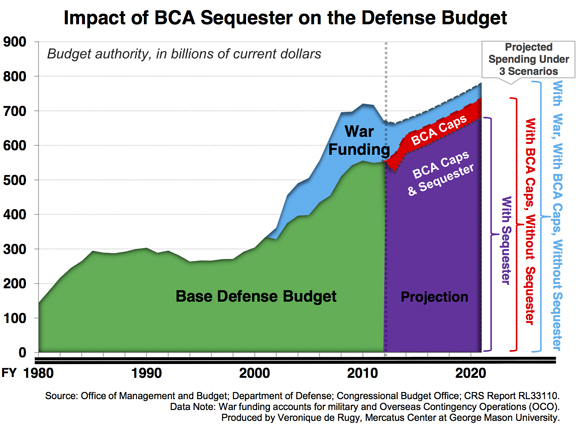Speaking outside a helicopter museum in eastern Pennsylvania yesterday, Republican VP candidate Paul Ryan bemoaned the “irresponsible defense cuts” and subsequent job losses that would occur under the Budget Control Act’s sequestration spending cuts. That would be the same Budget Control Act that Paul Ryan voted for, and, at least initially, defended.
From TalkingPointsMemo.com:
“What conservatives like me have been fighting for, for years, are statutory caps on spending, legal caps in law that says government agencies cannot spend over a set amount of money,” Ryan told FOX News’s Sean Hannity shortly after the agreement was reached last August. “And if they breach that amount across the board, sequester comes in to cut that spending, and you can’t turn that off without a super-majority vote. We got that in law.”
It’s not just Ryan’s backing away from the BCA’s spending cuts that’s irritating; it’s the fact that he’s basing his opposition to the cuts on the same flawed Keynesian rationale that the president used to justify his failed stimulus package. As Chris Edwards has noted, shifting resources from the government sector to the private sector is good for the economy:
Government shrinkage creates a positive multiplier, not a negative one, because the government releases resources—such as skilled workers from the defense industry in the 1990s—that are put to more productive uses in the private sector. You take an engineer from the Department of Defense or Energy and put her in the private sector producing goods for the market, and GDP will go up not down.
Economist Benjamin Zycher’s recent Cato Policy Analysis on the effects of reductions in defense outlays provides support for Edwards’ contention. From the summary:
A reduction in defense consumption and investment shifts resources among economic sectors and thus has economic effects analogous to those caused by changes in demand and supply in any industry. The unemployment (or underemployment) of labor and other resources during the adjustment process can be politically significant but has only temporary economic effects; however painful for some, this process of resource reallocation is economically beneficial in the aggregate over time. Moreover, the data suggest strongly that the adverse effects of spending cuts would be small in the aggregate because defense spending is a small component of GDP (less than 5 percent), and because estimates of the multiplier effects of defense expenditures reported in the scholarly literature are relatively low.
The reduction in defense spending—and thus in federal spending in total—would reduce as well the economic costs of the excess burden that the tax system imposes upon the economy, in the form of distortions that reduce aggregate output. A conservative estimate of that effect is 35 percent of the reduction in defense spending. Accordingly, a reduction in defense outlays of $100 billion per year can be predicted, conservatively, to reduce economic costs by a total of $135 billion per year. These potential savings in real resources are sufficiently large to justify a detailed analysis of U.S. national security needs and the outlays required to defend them. [My emphasis]
Instead of hiding behind defense-related job losses, Ryan should be explaining why he thinks even more resources should be diverted from the private sector to the military-industrial complex as Mitt Romney is proposing. While Ryan and his fellow Republicans have been critical of the Obama administration’s job creation schemes, treating the Pentagon like a jobs program is arguably even more egregious. William Hartung and Chris Preble nail it:
The defense budget is not a jobs program, nor should it be. Decisions on how many Humvees to buy, or how many bases to refurbish, should rest on military necessity, not economic expedience subject to political chicanery. When military procurement becomes nothing more than a series of thinly veiled pork-barrel projects, it risks exposing our troops to unnecessary risks, and ultimately undermines our security.
Finally, with regard to the actual military spending cuts that sequestration would impose, a new chart from Cato adjunct scholar Veronique de Rugy puts it in much-needed perspective:
Ryan calls that irresponsible? It would be irresponsible not to rein in military spending.
